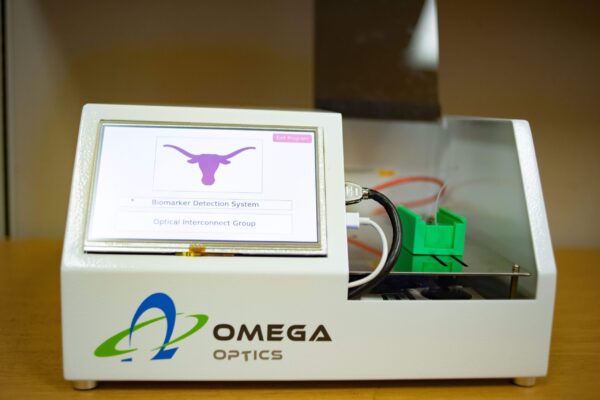AUSTIN, Texas — Three years into the COVID-19 pandemic, accurate testing remains a challenge, even more so as the virus has mutated over time, becoming more contagious with symptoms that are hard to tell apart from other illnesses. A new diagnostic device that can differentiate between COVID-19 and the flu, developed by researchers at The University of Texas at Austin, seeks to solve this problem while providing better and more portable care options for people who are without access to medical centers.
“Though COVID isn’t top of mind for most of us like in 2020, emergence of new variants has made it increasingly challenging to differentiate it from other infectious diseases with similar symptoms, such as the common cold and seasonal flu,” said Ray Chen, professor in the Chandra Family Department of Computer and Electrical Engineering and leader of the study published in Applied Physics Review. “Timely detection of COVID-19 is essential for patients to receive treatment and for curtailing the spread of the epidemic.”
The new “lab-on-a-chip” testing technology builds on a silicon complementary metal oxide semiconductor-compatible, photonic chip-based platform Chen and his team have been developing for several years. The goal is to provide lab-quality diagnostics, while shrinking them down to a portable size so they can reach people in isolated areas.

Eventually, the researchers aim to use this to test for dozens of different illnesses in a single sample, including COVID-19, influenza, other coronaviruses and even some types of cancer.
“The prospect of COVID-19 remaining part of lives long term underscores the urgent need for rapid testing and differentiation of infections with similar symptoms,” Chen said. “Our biosensing platform provides a promising solution to overcome the challenge and promotes the development of improved point-of-care diagnostic tools.”
Today, the gold standard for COVID testing are PCR tests. These are the next step up from the home tests that can be found in drug stores across the country.
They are extremely accurate at detecting the virus, even at small concentrations in early stages of illness. However, they require large labs, expensive equipment and trained medical personnel to operate.
In recent years, several other research groups have developed “lab-on-a-chip” testing solutions as a potential alternative to PCR. But many of these were not sensitive enough to detect the virus in early phases or when there is a low concentration of it in the sample.
The new testing platform overcomes this challenge, in addition to its ability to differentiate between illnesses. It features a “y”-shaped, double-layered microfluidic chip, which can test multiple samples at the same time, a 3D-printed holder and specialized packaging.
The platform is light-based in nature. It uses subwavelength grating micro-ring resonators that consist of a series of pillars with a period smaller than the operating wavelength and has a large sensing region, making it easier to detect samples at low concentration.
The project team includes Shupeng Ning, Kang-Chieh Fan, Po-yu Hsiao, Chenghao Feng and Devan Shoemaker, all of the UT Austin Chandra Family Department of Electrical and Computer Engineering; and Hao-Chen Chang of Omega Optics, an Austin-based startup that Chen founded to commercialize his discoveries. The project is funded through grants from the AFOSR MURI Research Center on Silicon Nanomembranes, the National Institutes of Health, the U.S. Department of Energy and the U.S. Army.




